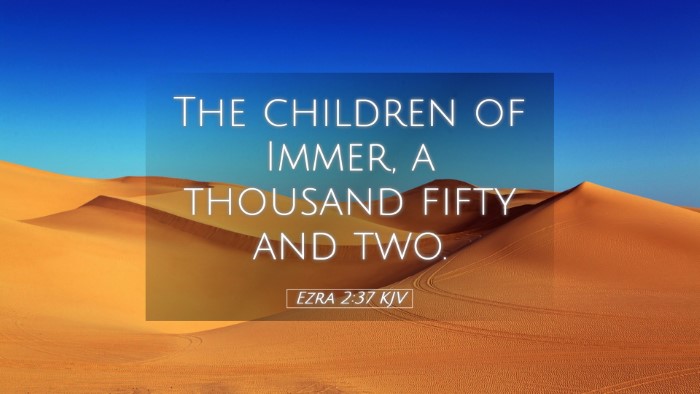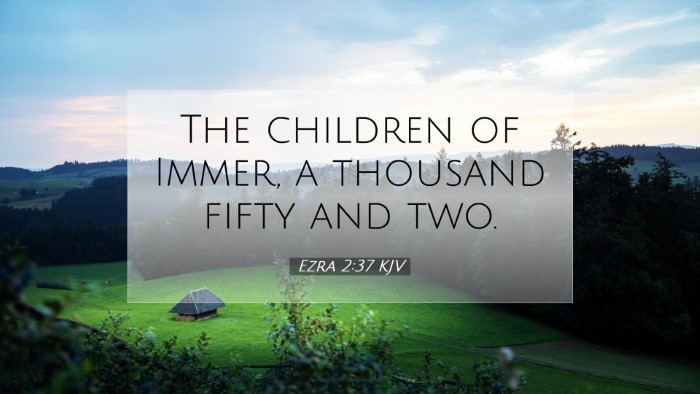Commentary on Ezra 2:37
Verse Reference: Ezra 2:37 - "The children of Azgad, two thousand three hundred twenty and two."
Introduction
The book of Ezra focuses on the return of the Jewish exiles from Babylonian captivity to Jerusalem. Chapter 2 is a notable record of the individuals and families who returned, offering a detailed account of the tribes and their numbers. Ezra 2:37 specifically mentions the children of Azgad, a group whose numbers highlight the larger context of restoration in post-exilic Israel.
Understanding the Context
Historical Background: The return from captivity occurred in three primary waves, initiated by the edict of Cyrus the Great around 538 BC. Ezra, as a priest and scribe, played a significant role in re-establishing the Jewish community in Jerusalem. The listing of families and tribes underscores the emphasis on continuity and identity for the returning exiles.
Significance of the Number
The number associated with the children of Azgad—2,320—reflects not just a count but a symbolic representation of God's faithfulness. These individuals represent restored hope and the fulfillment of prophecy regarding the return to the Promised Land.
Insights from Commentaries
Matthew Henry
Matthew Henry's Commentary emphasizes the importance of every individual in God's restoration plan. He notes that the specific mention of the families and their numbers serves to illustrate God's faithfulness in preserving His people through their trials. Each name and number in this list corresponds to God's promise to bring His people back to their land, showing that nobody was overlooked in God's great plan.
Albert Barnes
Albert Barnes' Notes on the Bible draw attention to the practical aspects of these genealogical records. The detailed enumeration of returning exiles acted as a reminder of the covenants made with Abraham, Isaac, and Jacob. Barnes suggests that understanding these names and numbers helps contemporary readers grasp the continuity between the Old Testament and the New Testament, as the faithfulness of God to Israel points towards the fulfillment of God's promises in Jesus Christ.
Adam Clarke
Clarke's Commentary on the Bible provides insight into the identity of the children of Azgad. Clarke connects this group to a possible lineage through the house of Phinehas, indicating their significance within the priestly and Levitical structure. He elaborates that the return of these specific families illustrated a divine orchestration, as such returns were not merely coincidental but part of a divine narrative where God orchestrated the destiny of His people down to familial lines.
Theological Implications
The mention of the children of Azgad can serve several theological implications:
- Restoration: This verse highlights the theme of restoration that runs throughout the Scriptures. God's ability to bring His people back from exile reflects His overarching sovereignty and mercy.
- Covenant Faithfulness: The enumeration serves as a testament to God's faithfulness to His covenant promises. Just as He promised the restoration of Israel, He continues to be faithful to His promises in the lives of believers today.
- Identity and Heritage: The importance of genealogy in this context showcases the significance of identity amongst God's people. Understanding one's heritage is crucial for maintaining faith and purpose.
Application for Today's Believers
Incorporating the lessons from Ezra 2:37 into modern ministry can be profound:
- Recognizing Individual Worth: Just as each name in the record represents value to God, pastors and church leaders are encouraged to remember that every individual in the congregation has intrinsic worth and is part of God's plan.
- Encouragement in Restoration: This verse can serve as a reminder of hope. No matter how dire circumstances may seem, God can restore and redeem every situation.
- Strength in Community: Understanding that they are part of a larger narrative can encourage believers to cultivate a sense of belonging. Churches can help congregants recognize their collective identity and purpose within the body of Christ.
Conclusion
Ezra 2:37, though seemingly a simple enumeration, encapsulates profound themes that resonate deeply within the Christian faith. The careful recording of the children of Azgad underscores God's faithfulness, the importance of community, and the value of each person's life in the grand narrative of redemption. As contemporary scholars, pastors, and students reflect on this verse, may they be inspired by the truth that God is actively working in the lives of His people, restoring and redeeming for His glory.


